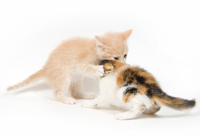|
||||||||||||||||||||||||||||||||||||||
Dietary Needs for Your Cat - Cat FoodBy Toy Dog For Sale Massachusetts Feeding Your Cat the Right Cat Food Nutritional Needs For the first five weeks of its life, a kitten should be nursing from its mother. At week five, kittens can start to be weaned, although they will continue to nurse until they are eight or ten weeks old, satisfying their need for suckling. Often, pet owners will feed the mother a nutrient-packed kitten food while she is pregnant and for the first few weeks after birth. At week five, you can start the kitten on the same canned kitten food that the mother has been eating; she should take to it readily. Be sure that the first ingredient listed is a specific meat source such as chicken, beef, or lamb. Kittens should continue to eat kitten food for the first year of life. At six weeks of age, kittens should be receiving at least four small meals spaced throughout the day. At twelve weeks you can increase the amount of food in each meal and gradually move toward three meals a day. At six months, meals can be spaced out to two times daily. At one year of age, most kittens are considered fully grown and can be switched over to adult food, fed twice daily. Because cats are capable of stopping themselves from eating when they have reached their nutritional requirements, you can also leave out a bowl of dry kibble throughout the day.
Types of Food For kittens, their diet should consist mostly of canned food, which is more nutritious. Keep track of whether your kitten’s diet is on track by regular weightings and also by paying attention to his hunger levels. Kittens should gain weight regularly, but you want to avoid bad eating habits early on such as overeating. So you are feeding your kitten a steady diet of premium canned kitten food that is high in the nutrients she needs to grow. However, what about when she wants to try people food? Kittens should not be fed table scraps for several reasons. Firstly, it interferes with their carefully balanced diet and also encourages bad habits. Even worse, certain foods are harmful or toxic to felines. Foods that should never be given to a kitten or a full-grown cat, even as part of a recipe, include: milk; green tomatoes and raw potatoes; onions, garlic, and similar root vegetables; grapes and raisins; and chocolate. Adult Cat Food Kittens, as mentioned earlier, have higher nutritional needs than adult cats. If you feed a kitten adult cat food before he is finished growing, he will not get the nutrients he needs. Because cats will continue eating until their nutritional needs are met, he will be forced to consume more cat food, which means more preservatives and filler. This could put your kitten at risk for obesity or medical conditions. Use proper feeding as preventative care; keep your kitten on kitten food until one year of age, and be sure to consult with your veterinarian when it’s time to make the switch to adult cat food. All of your nutritional questions and more can be answered by reading articles like this, books, and speaking with your vet. After you’ve mastered feeding your kitten, don’t forget that your cat’s nutritional needs change as he grows. A six-week-old kitten needs different food from a six-month-old kitten, which should be fed differently from a six-year-old, mature cat. Throughout your cat’s life, continue to pay attention to your vet’s recommendations and read cat food labels to meet your cat’s dietary needs and keep her happy and healthy. Pet Store in the Mall Cat Medicine / Feline Medication Need Free Content For Your Website? Free Content Reprint Article Alabama, Alaska, Arizona, Arkansas, California, Colorado, Connecticut, Delaware, Florida, Georgia, Hawaii, Idaho, Illinois, Indiana, Iowa, Kansas, Kentucky, Louisiana, Maine, Maryland, Massachusetts, Michigan, Minnesota, Mississippi, Missouri, Montana, Nebraska, Nevada, New Hampshire, New Jersey, New Mexico, New York, North Carolina, North Dakota, Ohio, Oklahoma, Oregon, Pennsylvania, Rhode Island, South Carolina, South Dakota, Tennessee, Texas, Utah, Vermont, Virginia, Washington, West Virginia, Wisconsin, Wyoming
|
||||||||||||||||||||||||||||||||||||||












